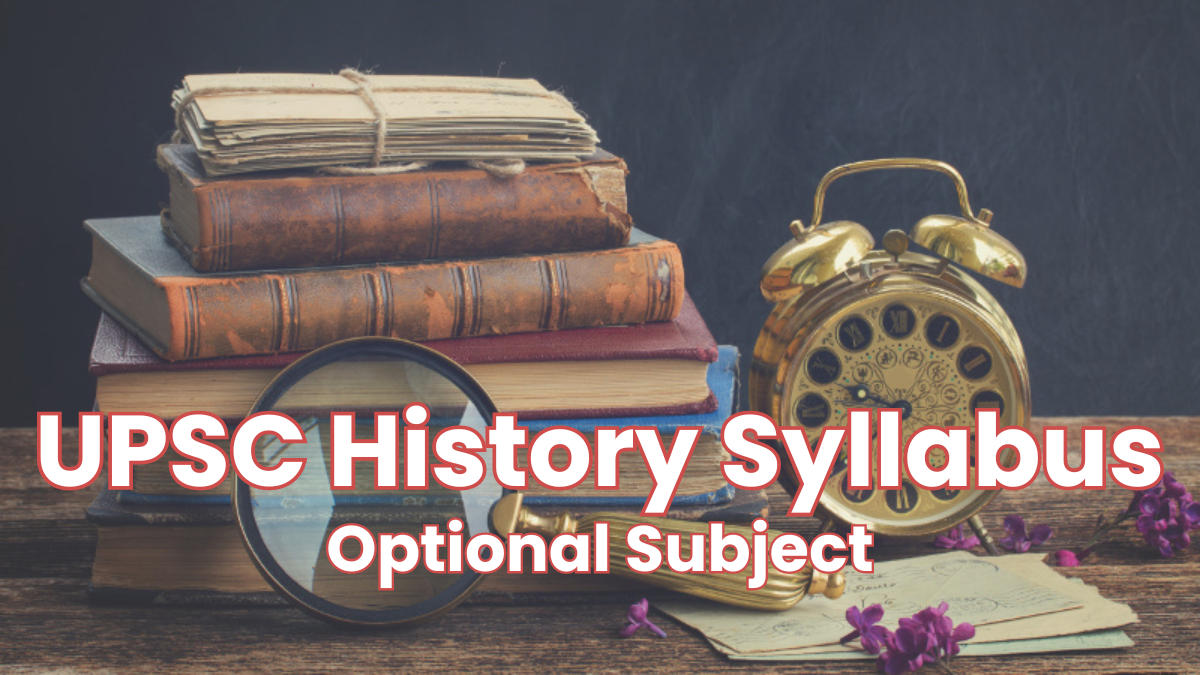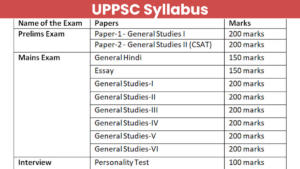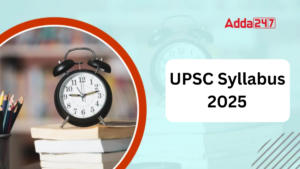Table of Contents
History is one of the popular choices among the 48 optional subjects in the UPSC Civil Services Examination. History Syllabus covers Ancient, Medieval, and Modern history in depth. History is the best option for candidates who enjoy reading theoretical parts and connecting the past with our ancestors. To complete the UPSC History syllabus, candidates need a smart study plan, consistent effort, and an understanding of important historical events.
UPSC History Syllabus 2025
The UPSC History Syllabus for the Civil Services Exam is divided into two major parts: Paper 1 and Paper 2, which are important to the optional History exam. The syllabus covers Ancient, Medieval, and Modern History. With regular practice and focused preparation, candidates can boost their chances of success.
| UPSC History Syllabus 2025 | |
| Full Form of UPSC | Union Public Service Commission |
| Exam Type | Civil Service Examination |
| Mode | Offline |
| Total Duration | 3 Hours |
| Exam Structure | Prelims, Mains, Interview |
| Official Site | https://upsc.gov.in/ |
UPSC History Syllabus 2025 for Prelims Exam
| UPSC History Prelims Syllabus 2025 | ||
| Ancient History | Prehistoric Times |
|
| Indus Valley Civilization |
|
|
| Vedic Period and Later Vedic Period |
|
|
| Sangam Period |
|
|
| Jainism |
|
|
| Buddhism |
|
|
| Mahajanapadas |
|
|
| Age of Mauryas |
|
|
| Post Mauryas |
|
|
| Age of Guptas |
|
|
| Vardhana Dynasty |
|
|
| Medieval History | Early Medieval Dynasties |
|
| South Indian Dynasties |
|
|
| Early Muslim Invaders |
|
|
| Sultanate Period |
|
|
| Emergence of Mughals |
|
|
| Consolidation of Power: Akbar’s Rule |
|
|
| Post-Akbar Mughals |
|
|
| Emergence of Marathas |
|
|
| Deccan Sultanate |
|
|
| Vijayanagara Empire |
|
|
| Rise of Regional Kingdoms |
|
|
| Modern History | Advent of Europeans |
|
| British Expansionism |
|
|
| British Administration and Constitution Development of India |
|
|
| Development of Education |
|
|
| Development of Press |
|
|
| Indian Renaissance |
|
|
| Personalities Involved in Indian Social Reforms |
|
|
| Peasant and Tribal Revolts in India |
|
|
| Post Congress Era |
|
|
| 1st Phase of Indian National Movement |
|
|
| 2nd Phase of Indian National Movement |
|
|
| Last Phase of the Indian National Movement |
|
|
| Governor Generals of India |
|
|
UPSC History Paper I Syllabus 2025
| Category | Details |
|---|---|
| Sources |
|
| Pre-history and Proto-history |
|
| Indus Valley Civilization |
|
| Megalithic Cultures |
|
| Aryans and Vedic Period |
|
| Period of Mahajanapadas |
|
| Mauryan Empire |
|
| Post-Mauryan Period |
|
| Early State and Society in Eastern India, Deccan, and South India |
|
| Guptas, Vakatakas, and Vardhanas |
|
| Regional States during the Gupta Era |
|
| Themes in Early Indian Cultural History |
|
| Early Medieval India, 750-1200 |
|
| Society, Culture, and Economy in the Thirteenth and Fourteenth Centuries |
|
| Cultural Traditions in India, 750-1200 |
|
| The Thirteenth Century |
|
| The Fourteenth Century |
|
| The Fifteenth and Early Sixteenth Century – Political Developments and Economy |
|
| The Fifteenth and early Sixteenth Century- Society and Culture |
|
| Akbar | Conquests and consolidation of the Empire
|
| Mughal Empire in the Seventeenth Century |
|
| Economy and Society in the Sixteenth and Seventeenth Centuries |
|
| Culture in the Mughal Empire |
|
| The Eighteenth Century |
|
UPSC History Paper 2 Syllabus 2025
The UPSC History Paper 2 Syllabus covers Modern India and World History, including topics like the European invasion of India, important figures like Robert Clive, and events leading to the 1947 Independence Act.
| Topic | Sub-Topics |
|---|---|
| European Penetration into India |
|
| British Expansion in India |
|
| Early Structure of the British Raj |
|
| Economic Impact of British Colonial Rule |
|
| Social and Cultural Developments |
|
| Social and Religious Reform Movements in Bengal and Other Areas |
|
| Indian Response to British Rule |
|
| Factors leading to the birth of Indian Nationalism |
|
| Rise of Gandhi |
|
| Other strands in the National Movement |
|
| Politics of Separatism |
|
| Consolidation as a Nation |
|
| Caste and Ethnicity after 1947 |
|
| Economic development and political change |
|
| Enlightenment and Modern ideas |
|
| Origins of Modern Politics |
|
| Industrialization |
|
| Nation-State System |
|
| Imperialism and Colonialism |
|
| Revolution and Counter-Revolution |
|
| World Wars |
|
| The World after World War II |
|
| Liberation from Colonial Rule |
|
| Decolonization and Underdevelopment |
|
| Unification of Europe |
|
| Disintegration of the Soviet Union and the Rise of the Unipolar World |
|
Preparation Tips for UPSC History Syllabus
Here, are some of the preparation resources added to you like using books and newspapers. use online resources through different web portals and platforms. Solve the UPSC Previous year’s questions to build a strong understanding of these topics. NCERT books are essential for building a strong historical foundation. Starting with NCERTs helps you master the history
- Previous Year Question Paper
- Best Books for the UPSC Examination
- Books- For Ancient India- Jha & Shrimali, NCERT, Sonali Bansal, For Medieval India- Satish Chandra, Imitiyaaz Ahmad, For Modern India- Spectrums, B.L Grover, and lastly, for world History- Jain & Mathur.
UPSC Prelims History Syllabus Booklist
Candidates should choose books that fully cover the static UPSC Prelims History syllabus. Regular revision is essential. Below is the complete booklist for the History syllabus:
| Book Type | Book Name |
| NCERT |
|
| Reference Books |
|
| Other Sources | Newspapers such as The Hindu and The Indian Express |
UPSC Prelims History Syllabus: Marks Distribution
In recent years, the History syllabus in UPSC Prelims has gained more weight. The questions are mostly factual and require a basic understanding of ecology and the environment. The detailed weightage of History questions is given below year wise:
| Year | Total History Questions |
| 2023 | 14 |
| 2022 | 14 |
| 2021 | 20 |
| 2020 | 20 |
| 2019 | 17 |
| 2018 | 22 |
| 2017 | 14 |
| 2016 | 15 |
| 2015 | 18 |
| 2014 | 20 |



 UPPSC Syllabus 2024: Prelims and Mains E...
UPPSC Syllabus 2024: Prelims and Mains E...
 AIBE 19 Syllabus 2024, Check Subject-Wis...
AIBE 19 Syllabus 2024, Check Subject-Wis...
 UPSC Syllabus 2025 for IAS Prelims, Main...
UPSC Syllabus 2025 for IAS Prelims, Main...







